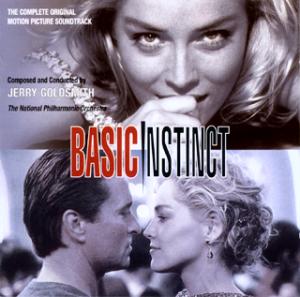************************************************************** EDITOR’s CHOICE August 2004 **************************************************************
Basic Instinct
Music composed and conducted by Jerry Goldsmith
Orchestrated by Alexander Courage
Performed by The National Philharmonic Orchestra
Available on Prometheus XPCD 154
Running time: 74.34
Amazon UK buysoundtrax

See also:
Total Recall
Hollow ManFor those not in the know, Basic Instinct (1992) is a luxuriously appointed psychological thriller, a modern day homage to Vertigo (1958), with Michael Douglas rather than James Stewart getting in over his head with an enigmatic blonde (Sharon Stone rather than Kim Novak) in San Francisco. So unusual was it that a major star vehicle would be so sexually explicit that more nonsense has been written about the film than any bar a handful of other releases from the 1990's, few critics seeing anything beyond exposed flesh and controversial sexual politics. Hardly anyone noticed Basic Instinct was one of the finest thrillers of the decade – easily a film to stand beside Carlito's Way, The Usual Suspects, The Game, LA Confidential and Arlington Road - an extremely well acted, plotted, shot and for our purposes, scored, darkly erotic suspense drama.
Indeed, in the remaining decade of his career Jerry Goldsmith never again worked at quite such a high level, crafting a soundtrack (performed by the superb National Philharmonic, rather than the usual session pick-up orchestra) which raised what with a more routine score might have simply been a very good film into something much more special. Basic Instinct is Jerry Goldsmith's last genuinely great score, and as such it is fitting that this expanded edition arrived in time to be the first Goldsmith disc reviewed on FMOTW since the composer's recent death.
The original Varèse Sarabande Basic Instinct OST played for around 40 minutes and gave a good account of the score. This new album almost doubles that running length, and while on one level the casual listener might consider they were getting simply more of the same the more attentive will find the full richness of Goldsmith's invention unfolded before them. Now I am not the sort of reviewer who regularly insists on having every note of a score – sometimes, as with The Thorn Birds, which I also review this month, less could have been more – but here despite some further repetition of already very familiar material from the original 40 minute long presentation the extra playing time does add an extra dimension to the music. If the major set-pieces of the score were already present and correct before, this expanded album adds a considerable number of previously unreleased cues of a more darkly atmospheric nature – material particularly taken from the first half of the film. (The music for the first murder 'First Victim' is offered for the first time in both the original and revised versions, the latter to take account of the shorter, less graphic cut of the scene as presented in American theatrical prints).
Throughout the score – clearly working in ghostly homage to the lushly post-Wagnarian romanticism of Herrmann's Vertigo – Goldsmith weaves sensual, long- limbed, ambiguously enticing and entrancing melody lines with subtly crafted, menacing electronics, blending the two with elegance and sophistication to perfectly match the film's blend of opulence and murderous psychosis. The result is one of the composer's most successful fusions of orchestral and electronic scoring, a work to stand beside Legend (1985), with an insidiously beguiling quality utterly different to the pyrotechnic machismo Goldsmith brought to his previous collaboration with Paul Verhoven – Total Recall (1990). Though something of the same icy, labyrinthine sensibility, an endless unresolved chase, would recur in Goldsmith's score for Verhoven's Hollow Man (2000), a less accomplished if still very worthwhile score.
As the score is so much of a piece I won't select individual tracks to discuss other than to mention the almost unbearable tension of 'Beth and Nick' as one new highlight, and that happily the album includes the full, almost ten minute version of the music for the final scene and end titles, 'Unending Story / End Credits', material severely truncated on the original Varèse disc. For some this alone will be reason to buy the disc, while those familiar with the film and original album may realise what additional treasures lie waiting here.
Simply one of Jerry Goldsmith's best scores, and one of the best written by anyone in the 1990's. Album of the month and a key requirement in any serious film music collection.
Gary Dalkin
5
Return to Index